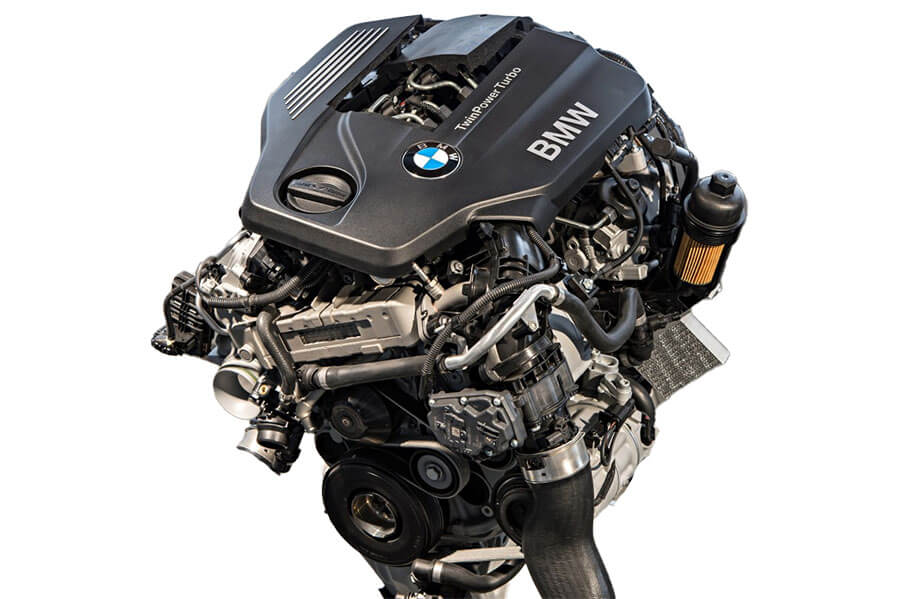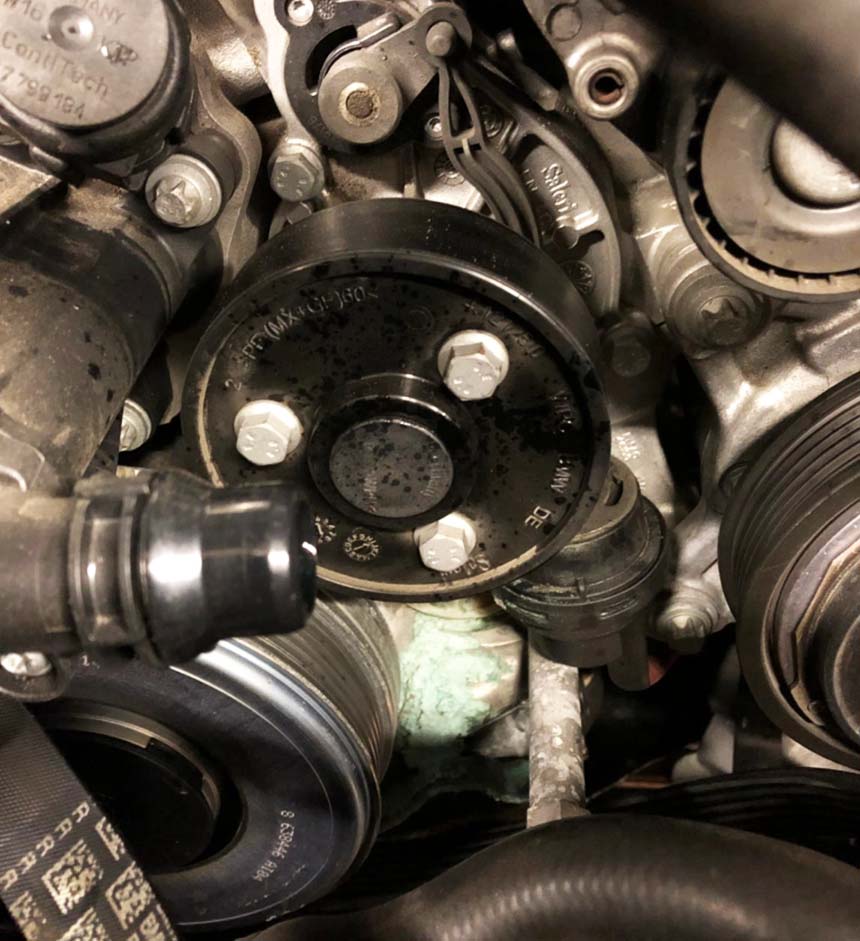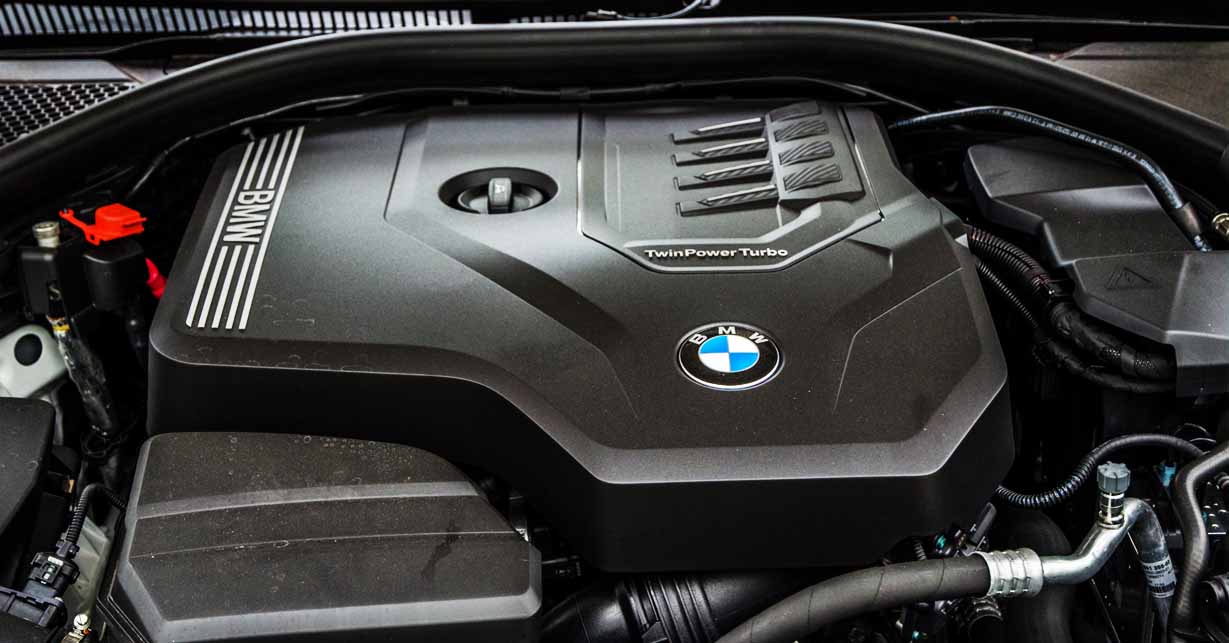The BMW B48 is a turbocharged inline 4-cylinder engine that was first introduced in 2015 replacing the N20. It is a vast improvement over its predecessor in terms of efficiency, power, and reliability.
Is the B48 reliable? Yes, the B48 has an above-average reliability and doesn’t have major failure points, but still requires maintenance and attention in some areas.
Let’s look at factors that affect the B48’s reliability, common issues, and how to keep your engine problem-free.

Common BMW B48 Engine Problems
1. Coolant loss
One of the most common reliability concerns with the B48 is coolant loss. This is usually associated with a difficult-to-spot coolant leak. Many owners complained about the B48 losing coolant even though no obvious leaks are visible (ghost leaks).
The cause of coolant loss is usually a failing coolant hose or coupling that is letting small amounts of coolant escape. If left unchecked, the engine could run low on coolant.
How to fix:
Pressure test the cooling system to attempt to find the leak. Watch out for white smoke coming from the exhaust, as it could indicate the engine is burning coolant.
2. Turbo return line leak
A fairly common issue on early-production BMW B48’s issue is a turbo return line leak. One of the lines that connect to the turbocharger may start leaking oil. This issue is caused by an incorrectly assembled “asbestos-free” gasket.
How to fix:
It’s a fairly simple fix and is covered under warranty. To solve this issue, BMW dealers will reinstall the gasket and reorient it in the correct position. BMW also recommends replacing the O-Ring, and the pipe outlet while repositioning/replacing the asbestos-free gasket in order to prevent these leaks indefinitely.
Note that this issue only affects early B48 engines.
3. Brittle coolant hoses
Old coolant hoses, connectors, and couplings can get notoriously brittle, especially if located near the hottest engine parts. BMW uses plastic for many of these connectors on the B48, which tend to contract and expand and thus can crack, break, and cause a leak.
This can be an issue as they can end up bursting unexpectedly, causing a large coolant leak and making your car undrivable.
How to fix:
Regularly inspect the engine bay for coolant leaks and replace any hoses or couplings that show signs of leakage.
4. Water pump failure
The B48 has a split cooling system with two water pumps. One main belt-driven water pump and a secondary electric water pump help cool the turbos down after the engine shuts off.
Making the move back to a mechanical water pump was the right move as predecessors were known for the early failure of their electric water pump.

That said, the main water pump on the B48 can fail unexpectedly, leaving the car in limp mode or leaving you stranded in the worst-case scenario.
How to fix:
If your B48-powered car has over 100,000 miles, it is recommended to proactively replace the main water pump to ensure the proper functioning of the cooling system.
5. Injector failure
If you’re experiencing misfires even after replacing all spark plugs and ignition coils, this could point to a bad injector.
Unfortunately, injector failure on the B48 can be a common issue for early versions of the engine. The issue is exacerbated in tuned engines due to the increased heat and strain.
On the rare occasion that the injectors fail in the open position, this could cause a cracked piston if the problem is left unchecked for too long. The excess fuel in that cylinder washes off the oil, and without enough lubrication excessive heat is generated.
How to fix:
Replace injectors before 80,000 miles if your BMW is equipped with an early pre-2019 B48.
6. Carbon buildup
Carbon buildup is a common issue that can affect any engine with direct injection such as the B48. Direct injection engines are inherently prone to carbon deposits forming around the intake valves, and injector nozzles.
Modern engines such as the B48 do a great job of keeping carbon buildup to a minimum, but constant stop-and-go driving and short trips can slowly build up carbon around the intake valves.
How to fix:
For B48 engines with over 100,000 miles, a walnut blast service is recommended to remove carbon deposits. Driving habits that include frequent longer trips can help minimize carbon buildup.
Keeping engine problems in the B48 to a minimum
- Common BMW B48 maintenance items besides oil and coolant changes are: water pump, spark plugs, ignition coils, and accessory belt. If you take proper care of each of these, your B48 should be able to stay trouble-free for the most part.
- Allow the engine to reach operating temperature before putting it under high loads. Cold oil does not lubricate as well, and high RPMs on a cold turbocharged engine can reduce the lifespan of the engine.
- Avoid driving only short distances. It’s a good idea to take your car out for a prolonged drive every few weeks in order for it to properly warm up all the fluids. This can also help control carbon buildup.
B48 long-term reliability
It’s difficult to tell how well the B48 is going to fare long-term as the engine is still fairly new. However, there are certain aspects to consider:
- Turbocharger longevity: If you plan on keeping the car for an extended period, it is likely that you will need to replace or rebuild the turbocharger at some point. Gently highway-driven B48 turbos might outlast the car but if your G20 is heavily tuned, the turbocharger could fail before 150,000 miles.
- High-mileage oil leaks: The B48 uses higher-quality gaskets compared to older BMW engines, reducing the severity of oil leaks. However, the valve cover gasket, oil filter housing, and oil pan gasket will likely start leaking between 150,000 and 200,000 miles.
The internals of the B48 are able to last 200,000 miles and beyond. Its robust closed-deck engine block helps the B48 longer than its predecessor. Frequent oil changes extend the life of engine internals, timing chain, and valvetrain components.
We think that the B58 will be a more reliable engine than the B48 if you plan on keeping the car for hundreds of thousands of miles. BMW has a history of making robust and long-lasting inline-6 engines but the same can’t be said for their inline-4 engines.
While it is difficult to determine the exact lifespan of any engine, taking good care of your B48 engine and addressing any issues promptly will contribute to its long-term reliability.
Closing thoughts: Is the B48 reliable?
Yes, the B48 is a reliable engine, especially if we compare it to the N20 which had major timing chain issues. Improvements in the timing chain, injectors, a new heat encapsulation system, and a strong closed-deck engine block make the B48 a stout powerplant.
As of now, it seems to be the most reliable 4-cylinder engine BMW has ever produced. Within the modular “B” series of engines, it does fall short of the B58 which seems to be the most reliable engine in the family.
Get the turbo oil line leak addressed if your engine is affected, and keep an eye out for possible coolant leaks. In conclusion, the BMW B48 engine brings improved reliability to the turbocharged 4-cylinder lineup of the Bavarian automaker.

